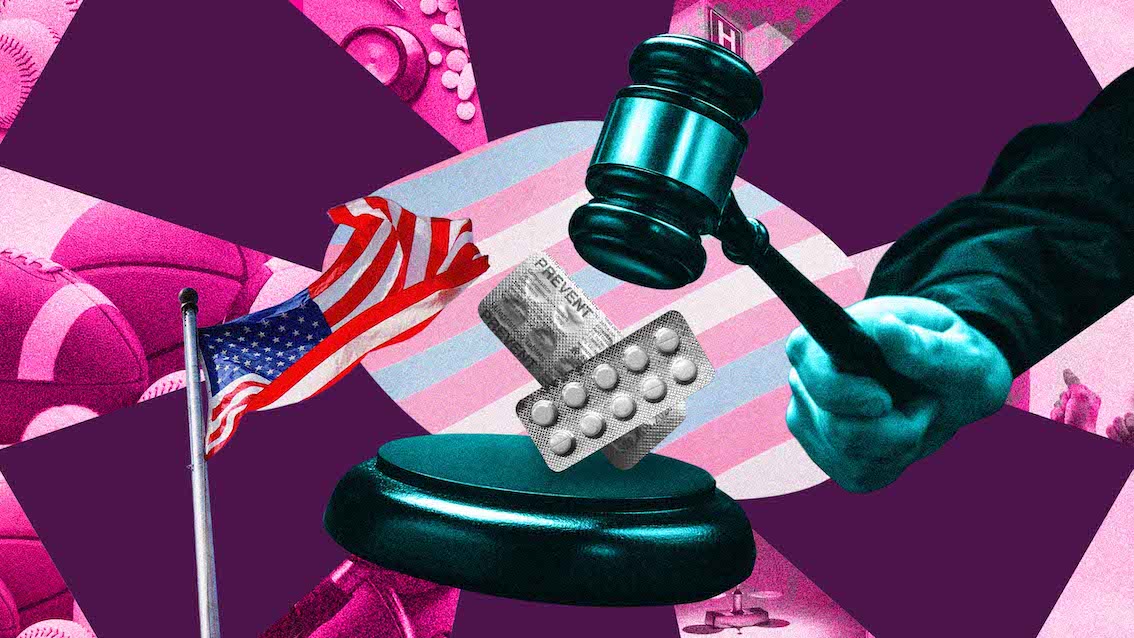The United States Supreme Court heard arguments Tuesday on a case that could have far-reaching consequences on access to mifepristone, an abortion pill. Some advocates are worried it could also have a significant impact on access to gender-affirming care for trans people over the long run.
The case, FDA v. Alliance for Hippocratic Medicine, is a dispute between the Food and Drug Administration and a newly formed anti-abortion group over whether the federal agency is allowed to approve distribution of mifepristone through the mail. At the heart of the case is a question over whether the FDA should allow abortion pill prescriptions through telemedicine and whether it should be made available through 10 weeks of pregnancy. But another aspect of the case could end up reviving a century-and-a-half-old federal law against obscenity that is no longer enforced: the Comstock Act.
According to Vox’s courts correspondent Ian Millhiser, the Comstock Act was originally written and passed in 1873—a time in U.S. history when the concept of constitutional free speech functionally didn’t exist. Named after an overzealous anti-vice campaigner and mail inspector, Anthony Comstock, the bill was first signed into law by President Ulysses S. Grant.
It was originally designed to restrict the spread of “corrupting” materials meant to appeal to a “prurient interest,” along with restricting distribution of abortion-related materials. Comstock himself used the law to target and persecute hundreds of abortion providers, and even once bragged about how his prosecution of abortion providers resulted in multiple suicides.
The law granted sweeping power to government and postal service officials who objected to all sorts of perceived “sexual materials,” and in many ways the overzealous pursuit of enforcing the law birthed the modern free speech legal movement.
In the early 1970s, two Supreme Court cases, Roe v. Wade and Miller v. California, essentially put enforcement of Comstock on ice, though it still remains on the books. Roe essentially nullified enforcement of its anti-abortion provisions, while Miller heavily limited the definition of “obscene” materials classified as illegal under Comstock.
Since the overturning of Roe in 2022, anti-abortion activists have begun to push for a restoration of enforcement of Comstock and Tuesday’s case was supposed to be the first big step toward that goal.
Thankfully, the case met a skeptical audience at the high court this week, with only the ultra-conservative justices Samual Alito and Clarence Thomas showing sympathy to the anti-abortion group’s arguments.
If the court were to choose to restore Comstock’s anti-abortion provisions, though, that could potentially be used to crack down on hormones and puberty blockers distributed through the mail. Many conservatives have taken to pushing back against gender-affirming care on the same basis as they push back on abortion access. In 2023, conservatives in Nebraska linked the two issues by passing a 12-week abortion ban and a ban on gender-affirming care for minors in the same bill.
Comstock could turn into an even more powerful conservative weapon if conservatives try to reinstate the heavy restrictions on distributing so-called “obscene” material. This, after all, was the claim that drove a small number of conservative activists to ban and in some cases even burn hundreds of books with queer and trans themes.
Conservatives with a renewed Comstock Act could run rampant over American culture, and trans people would be put at the tip of the sword. Perhaps even articles like the one I’m writing could be deemed illegal, the wording of the law is certainly vague enough. Early courts instituted the “Hicklin” rule as the enforcement standard for this part of Comstock. The rule stated that art, literature or other creative works could be banned if they could “deprave and corrupt those whose minds are open to such immoral influences and into whose hands a publication of this sort may fall.” Under modern conservative political theory, anything remotely positive toward queer or trans identities is a so-called corruption of youth.
It’s not difficult to imagine a conservative president using this law to purge society of all things trans- and queer-related.
That would likely take another Supreme Court decision or two to put in place, and thankfully even many of the conservative justices on this court seemed reluctant to give another win to the conservative movement. There’s been a growing chorus of progressives and pro-choice activists for Democrats to officially repeal the Comstock Act in full.
Given the electoral environment we’re in now, it seems like a good call for Democrats to campaign on Comstock, or at least the reproductive rights part of the issue. It remains to be seen whether even a Democratic trifecta of controlling both houses of Congress and the White House would be able to repeal the law, which would likely have to overcome a Republican filibuster.
But for LGBTQ2S+ people and reproductive rights advocates, the Comstock Act is another reminder that our best interest—and our liberation—lies in having a government that stays out of our personal lives.


 Why you can trust Xtra
Why you can trust Xtra


